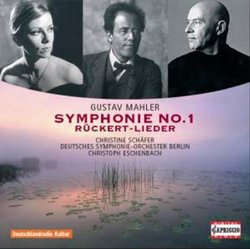| All Artists: Mahler, Schafer, Deutsches So Berlin, Eschenbac Title: Symphonies 1 / Ruckert Songs Members Wishing: 0 Total Copies: 0 Label: Capriccio Original Release Date: 1/1/2010 Re-Release Date: 4/27/2010 Genre: Classical Style: Symphonies Number of Discs: 1 SwapaCD Credits: 1 UPC: 845221050263 |
Search - Mahler, Schafer, Deutsches So Berlin :: Symphonies 1 / Ruckert Songs
 | Mahler, Schafer, Deutsches So Berlin Symphonies 1 / Ruckert Songs Genre: Classical
|
Larger Image |
CD Details |
CD ReviewsA good Mahler First paired with Schafer's affecting, memorab Santa Fe Listener | Santa Fe, NM USA | 05/17/2010 (4 out of 5 stars) "Come for the symphony, but stay for the songs. I've never noticed Eschenbach to possess surpassing talent as a conductor, but he must do something right, having achieved a notable big-name career. I try to keep up with his many recordings; some are good, certainly, but you'd never guess form the trail of good reviews how many are mediocre. In general, his Mahler has proved to be slack and ordinary. that, of course, may be a good way to succeed. But cynicism will do us no good. Here is the Deutsche sinfonie-Orchester of Berlin, best known to old timers under its postwar name as the RIAS Symphony, a radio orchestra founded in 1946 by the American occupiers (RIAS stands for Radio in the America Sector). In the welter of Berlin's many orchestras, I haven't kept up with this one. It seems to fall behind Barenboim's Staatskapelle Berlin, however.
The orchestra sounds good here and is well recorded. Even tiny labels like Capriccio seem to have no problem with that. Eschenbach leads a straightforward first movement. Whether it's due to him or less-rhan-stellar players, there is little mystery or atmosphere. As the movement progresses, the pace gets slower and the mood quieter; in some ways that's fairly evocative. Too bad that Eschenbach can't capture the magical resolution to the tonic when the horns enter. The climax makes a nice resounding noise. Tempo and dynamics are moderate in the landler-like Scherzo. The underlying momentum is kept going for the most part. Continuing down the middle of the road, the parodistic funeral march is played straight but with a nice tenderness. the Jewish klezmer band is affectionately evoked with lingering rubato. The stormy opening of the finale begins with less shocking impact than in many recordings, but I've had enough of shock, so this wasn't a drawback. Eschenbach is canny enough not to push his musicians too far; everything here is carefully judged rather than being played for maximum impact. In all, a pleasing performance without breaking any new ground. Quite a few Mahler Firsts come with no filler, so it's welcome to get the five Ruckert songs from Christine Schafer. Her lyric voice has darkened with age, and at this stage there are a few technical flaws. But Schafer is an artist, always worth hearing, and we find her in beautiful voice. Eschenbach is an accomplished accompanist to singers; if only he didn't favor some exaggerated slow pacing here. The real attraction is Schafer's imaginative, dramatic readings. Even lacking the sheer power needed to rise to the climax of Um Mitternacht, she finds so much passion that you barley notice. I wouldn't object if someone named "Ich bin der Welt abhanden gekommen" as the greatest lied after Schubert, and its long, arching line is difficult, especially when drawn out nearly to 8 min. as it is here. Schafer divides the line into shorter segments and manages a lovely, memorable rendition, which is true of the whole set." |

 Track Listings (9) - Disc #1
Track Listings (9) - Disc #1